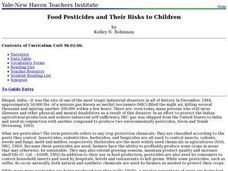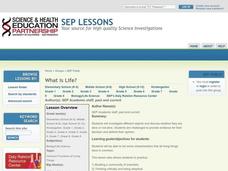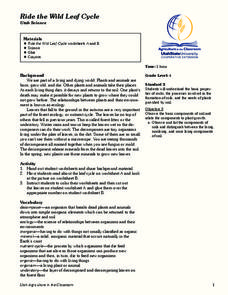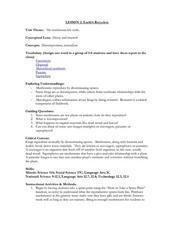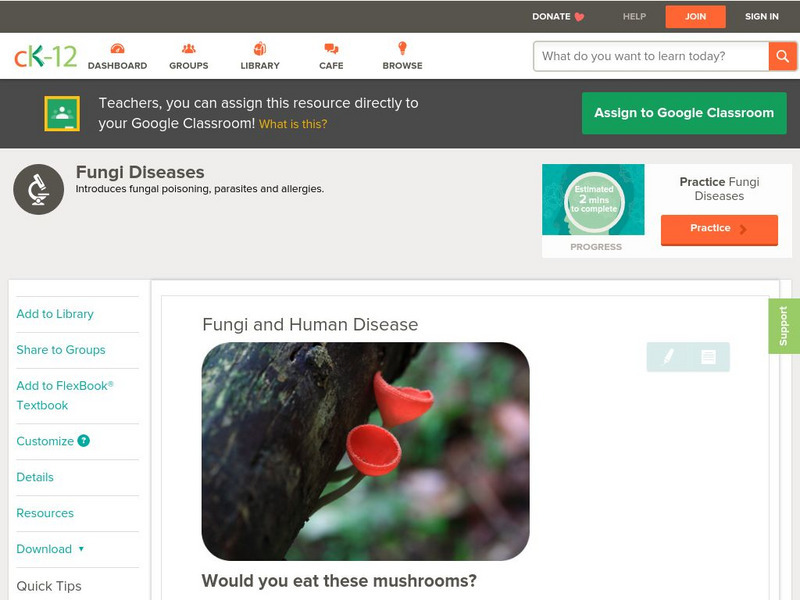Curated OER
Health: Food Borne Illnesses
Students discover how to inhibit food borne illnesses by practicing safe food-handling techniques. Among topics they examine are the advantages and disadvantages of using wooden or plastic cutting boards. After studying for the test,...
Curated OER
Honey Bee Biology
Students review the basic parts of an insect and explore the anatomical characteristics of a honey bee. The second part of the lesson focuses on ways to identify a honey bee from other stinging insects.
Curated OER
Food Pesticides and Their Risks to Children
Students examine an industrial disaster in India which affected the food for generations to come. In groups, they research the history of pesticides and place them into groups based on the type of pests they control. They partcipate in...
Curated OER
Forest Floor Terrarium
Students study the aspects of a forest floor ecosystem, including decomposition, the water cycle, food webs, the needs of living things, and physical vs. chemical change over an extended period. In addition, students conduct observations...
Curated OER
Everything's Connected
Students explore how trash decomposes. In this ecosystem lesson, students discuss new vocabulary words, such as producers and consumers, and think critically to answer how landfills work.
Curated OER
What is Life?
Students investigate the characteristics of living things. In this life science lesson, students examine several living and non-living specimens. Students determine which things are living and non-living.
Curated OER
Ride the Wild Leaf Cycle
Fourth graders complete a worksheet. In this life cycle lesson, 4th graders learn about the leaf cycle and complete a worksheet where they put the leaf cycle steps in the correct order.
Curated OER
Vocabulary: Kansas Prairies
Students explore the ecosystem by reviewing scientific vocabulary terms. In this environmental awareness lesson, students identify the differences between abiotic and biotic factors and their relationship to the Earth. Students define...
Curated OER
Earth's Recyclers
Students work together in groups to report on different topics related to decomposition. They answer questions and share their answers with the class. They discuss any topic that is unclear.
Curated OER
What's the Matter with My Orange?
Students use oranges to informally explore decomposition, dehydration, fermentation, the water cycle, bacteria, yeast, food webs, the needs of living things, and physical vs. chemical change over a period of three or more months.
Science Museum of Minnesota
Thinking Fountain: Making Mold
Thinking Fountain, from the Science Museum of Minnesota, offers a project in word and picture. With everyday items, you can grow your own mold, both bread mold and penicillin!
BioEd Online
Bio Ed Online: Fungus Among Us
Fungi grow from spores and fungi spores are present almost everywhere. Molds and other fungi grow in damp places. In this lesson plan students will grow and observe bread mold and other kinds of common fungi. Student sheets are provided...
Exploratorium
Exploratorium: Mold Terrarium
Exploratorium helps you to grow your own mold terrarium. Includes directions and an explanation for what you see growing on your food!
Virtual Museum of Canada
Virtual Museum of Canada: The Fungus Among Us
This site is full of easy to understand information about fungi. From science to folklore and funky facts there is something for everyone.
CK-12 Foundation
Ck 12: Life Science: 6.5 Mold
Learn about several different types of fungus-like protists.
CK-12 Foundation
Ck 12: Life Science: Fungi
[Free Registration/Login may be required to access all resource tools.] Ever notice blue-green mold growing on a loaf of bread? Do you like your pizza with mushrooms? Has a physician ever prescribed an antibiotic for you? Learn more...
CK-12 Foundation
Ck 12: Biology: Fungi and Human Disease
[Free Registration/Login may be required to access all resource tools.] Overview of human diseases caused by fungi.
Bill Nye
Bill Nye: Mold Madness
This tutorial from Bill Nye introduces the difference between mold and plants through a mold growing contest on pieces of bread.
CK-12 Foundation
Ck 12: Life Science: 6.10 Fungi Classification
Understand the behaviors, characteristics, and classification of fungi.
CK-12 Foundation
Ck 12: Life Science: 6.7 Fungi
Explore the characteristics and classification of fungi.
University of California
Ucmp: Introduction to Slime Molds
This University of California Berkeley site offers a definition of slime molds, structure, and life cycle.
Wikimedia
Wikipedia: Slime Mold
Wikipedia provides several paragraphs of information on slime molds, members of the Protista kingdom. Includes image.
BiologyWise
Biology Wise: Bread Mold Facts
Explains what bread mold is, what causes it to grow on bread and other surfaces, types of bread molds, health risks, and some benefits.
BiologyWise
Biology Wise: What Causes Growth of Bread Mold and How to Prevent It?
Explains what bread mold is, what causes it to grow on bread, factors that contribute to its growth, and how to prevent its growth. Includes an experiment for growing mold on bread.




